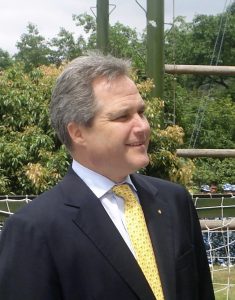
Ever since I was a student at Les Roches, I knew that I wanted to become a Hotel General Manager. There was a certain glamour and charm attached to the role which was effortlessly upheld by the many iconic General Managers of the last half-century. However, wanting to become a General Manager and understanding what a General Manager does are two very different things that I’d need to get to the bottom of.
Even since graduating in 2014 I’ve often thought that the role of a General Manager can be rather mystifying at times, so what better way to fully understand the role than to jump into the mind of one of the most successful alumni general managers of our time?

Martin van Kan, Area General Manager UK&I Hotel Operations InterContinental and class of 1984 alumnus, is the epitome of an international hotelier, with over 25 years of management experience across 16 countries and 4 continents. Martin describes himself as having a healthy curiosity for creating a better and different tomorrow, what makes him stand out as a true leader, is his dedication to nurture and inspire the next generation of talent.
Throughout my discussion with Martin, we were able to explore thought-provoking topics ranging from how to be successful in new environments, charting through career paths, and how the role of a General Manager has changed over the years. I started by asking Martin about the secret to his consistent success.
You truly have a remarkable career spanning a multitude of exciting hotels and countries. What has been your secret to successfully settling in to the many hotels and work cultures that you have immersed yourself into over the years?
I would say firstly one of the key factors to successfully immersing yourself into a new environment is the desire of the individual to truly want to go out and experience new destinations. It demonstrates a lot of courage to go out into an environment that you know nothing about. You’re exposing all of your vulnerabilities and I think people are hesitant to do that these days. Although, the minute that you close a door, you close the door on opportunities.
Having said this, it’s about allowing yourself to be open-minded, wanting to explore those opportunities, and not being hesitant to display those vulnerabilities that you have whether they are fear or apprehension. By being vulnerable, you allow people to see what you’re good at or not good at, ultimately, drawing on certain people to help you be successful.
“As a leader in a new environment, it’s important to listen with the intention of understanding.”
When you’re immersing yourself into a new culture or environment, you must remember that you are significantly the minority. People have very high expectations of you, but if you go in there as a roller on a newly laid road, you will find yourself in trouble. You have to accept that there will be that learning and settling in period, which will allow you to adapt to cultural or organizational customs.
As a leader in a new environment, it’s important to listen with the intention of understanding. Ask questions with the intention to learn something new and not for the sake of asking the question, because that shows you want to learn and be accustomed to what exists in that environment. It’s very important that you are demonstrating adaptability or the desire to be adaptable.
“It’s not about making wholesale changes, but understanding how the team got to where they are and how you can continue to influence their journey.”
As young managers, there is very so often a propensity to want to go in and quickly make changes. This doesn’t work because these managers are fueled by adrenaline, so as a result we often see short term gains convert into long term disasters. When going into a new role, settle in and allow things to happen around you and take time to evaluate how the team is working. It’s about being able to adapt smartly and not quickly. It’s not about making wholesale changes, but understanding how the team got to where they are and how you can continue to influence their journey.
As human beings, we have a tendency to believe that we are the best person for the job and downplay the efforts of those who preceded us. Young managers may be quick to criticize the way the operation was previously run, although what we tend to forget is that the people who we are surrounded by may be the same team members that were around the predecessor.
“It’s important to avoid making comparisons in public .”
This begs the question of who you are criticizing, the predecessor or your new team? This tends to be an area that many young leaders fail in, so it’s important to avoid making comparisons in public. Instead, realize that it’s just as important for you to adapt to your new surroundings as it is for your team to adapt to you and your leadership style.
The role of a hotel general manager can be rather mysterious to many aspiring hoteliers. How has this role changed from when you were a young professional to the current era?
Before going to Les Roches, I drew inspiration from a GM by the name of Dario Regazzoni at the Marco Polo Hotel in Singapore (part of the Peninsula group). He was impeccably dressed, had a presence when he walked through the hotel, knew his team by name, and was the front face of the hotel to guests. He was really good at doing the being. He wouldn’t hesitate to bend over and pick up a piece of paper in the lobby or straighten a curtain.
“You can be a person that does the doing or you can be a person that does the being.”
I wonder if the young General Managers of today will bring that same level of presence into what it is that they do. When I mention that he was very good at doing the being – I often use this expression “you can be a person that does the doing or you can be a person that does the being.” As you climb the ladder and progress in your career, you are very much the person that does the doing until you become a senior leader. At that point you become more of a being person. Whether it is being present, being influential, or being a decision-maker. The being is a lot more strategic and thoughtful.
Automation has released GMs
Hotels in the past have historically operated on a manual basis – there was little to no automation. Back then, General Managers would spend their time looking through balance sheets and purchase orders, while today’s General Managers oversee revenue streams through online channels or managing accounts through variance finance systems.
Essentially, they’re still performing the same tasks, albeit just using different tools. Nowadays, there are also a lot less staff in hotels now because of either clustered or shared services, so we now see General Managers a lot more involved on the floor.
Subservience has been replaced by true leadership
In the past, hotels have been very hierarchical. Everyone respected everybody above them – I’m not saying that they don’t today, but the traditional type of hierarchy is gone, and we find ourselves being a much friendlier industry rather than a hierarchical driven one. I believe this change has had a very strong influence on creating great leaders, specifically people-leaders, because you feel a lot more comfortable making decisions as well as bold moves, which leads to innovation.
“Today, what gets you to the top is being savvy, a great commercially-oriented individual, who understands the business and understands the drivers of the business.”
Hotels are a lot more streamlined today, which allows General Managers to be appointed from different disciplines, such as Engineering, Finance, Revenue, etc. instead of a primarily F&B focused background that has been traditionally preferred in the past. Today, what gets you to the top is being savvy, a great commercially-oriented individual, who understands the business and understands the drivers of the business. You’ve got computer systems telling you if you’re operating at a profit or a loss, so it’s more about the character that goes behind it now which makes the difference.
“It’s imperative for General Managers to understand the owner’s needs”
Lastly, there’s a lot of focus today on owner relationships. General managers have to understand the difficulties that an owner goes through to raise the capital to build the hotel, as well as understand the demands of the owner from their banks and creditors. It’s imperative for General Managers to understand the owner’s needs and what you’re able to deliver for the owner, the hotel, and the brand, and how you get all of that working together in order to form a type of symbiotic relationship.
How did you chart your career path from when you first graduated, through the years to becoming an Area General Manager?
When you chart your course, that course must be based on a goal that you’ve set. As a young hotelier in Les Roches, I had an opportunity to sit down with then General Manager, Mr. John O’Shea, of the Intercontinental Portman Square (Now Nobu Portman Square) who asked me to write down my goal.
At the top of the piece of paper, I had written down ‘General Manager’ followed by the subsequent roles that would get me there through my journey, along with the age I wanted to be when reaching that objective. I was strict with myself not to deviate from this timeline that I set for myself, in fact it was slightly accelerated due to my adaptability and flexibility to seize opportunities.
The first rule that I gave myself was that I was never going to allow myself to be promoted in the same hotel, or at the very minimum not the same department. If I was going to be promoted then I would be promoted in a different hotel, although still under the same company which I would pledge myself.
“Avoid changing companies for the sake of position or title and get a company to be committed to your growth plans.”
I was going to give at least one company ten years of my loyalty, but that company had to prove to me that they were going to be loyal back to me and my own career growth. I believe it’s beneficial to stay true to a company that is going to be true to you. Generation Z is not known for their brand loyalty, but I do believe that those who demonstrate loyalty will be looked after. I appreciate when someone comes to me during an interview and says to me that I will stay loyal to your brand for the next 5 years, although I want to know what’s in it for me. Avoid changing companies for the sake of position or title and get a company to be committed to your growth plans.
In order to accelerate your career, take advantage of being young and mobile by moving around and gaining new experiences. I’m certainly not going to suggest finding discomfort, because that is not what is natural to us. We seek a journey or a path that we know we can be successful on. I don’t believe it’s always going to be the easiest choice, but you must forge a path that will challenge you.
What advice would you share with the young leaders of tomorrow aspiring to follow in your footsteps?
Manage your expectations
The expectations of young graduates must be adapted to the situation, both from a position of entry and a remuneration point of view. Accept that starting at the base of the ladder is, and could be, a reality. Understand what you need to do, not what it is you are willing to do. Very rarely do managers hire degrees, experience comes first, backed up by a degree.
Think ahead
A hotel school graduate aspiring to be a young leader needs to be adaptable, one who thinks ahead and comes up with solutions to problems that haven’t even been discovered yet. Plan for the eventualities even if you don’t know what they are yet.
Understand the business
You need to be commercially savvy and understand everything that is happening around you, because everything affects the business. When I talk to young leaders today, I tell them that you must understand your business. What are the drivers that drive your business? It’s not about the supply chain, but about what affects your supply chain. That’s what ultimately affects your business. In the old days, you didn’t have that ability to dive deep to access that type of information.
Having had such an accomplished career, what has been the single most fulfilling moment as a GM in your career?
A long time ago, I decided that my purpose was to be an inspired General Manager who seeks to inspire others. I mean this in such a way where I can get the best out of my team, ensuring they are given the opportunity to demonstrate the best that they have, but in a way which they enjoy doing what they do.
At the end of the day, the most fulfilling feat for me is to watch others grow and hopefully having been an inspiration to them along the way. That for me is the most rewarding accomplishment that you could ever come across. It fills me with joy when I see past Assistant Front Office Managers, Sales Managers, and F&B Managers who I’ve worked with in the past, have become some of the most inspirational General Managers in their region.
Be mentored by Martin
Young leaders of tomorrow will not always have all of the answers while navigating their career paths, so it’s important to reach out to industry leaders for advice and guidance. Even if it is not answers we seek, using our mentors experience as a template into finding our own success could prove to be all the difference in creating your own triumphs.
Martin has generously offered to be a coach or mentor to Les Roches students on a first come first served basis. To take him up on this incredible offer, connect with him on LinkedIn.



